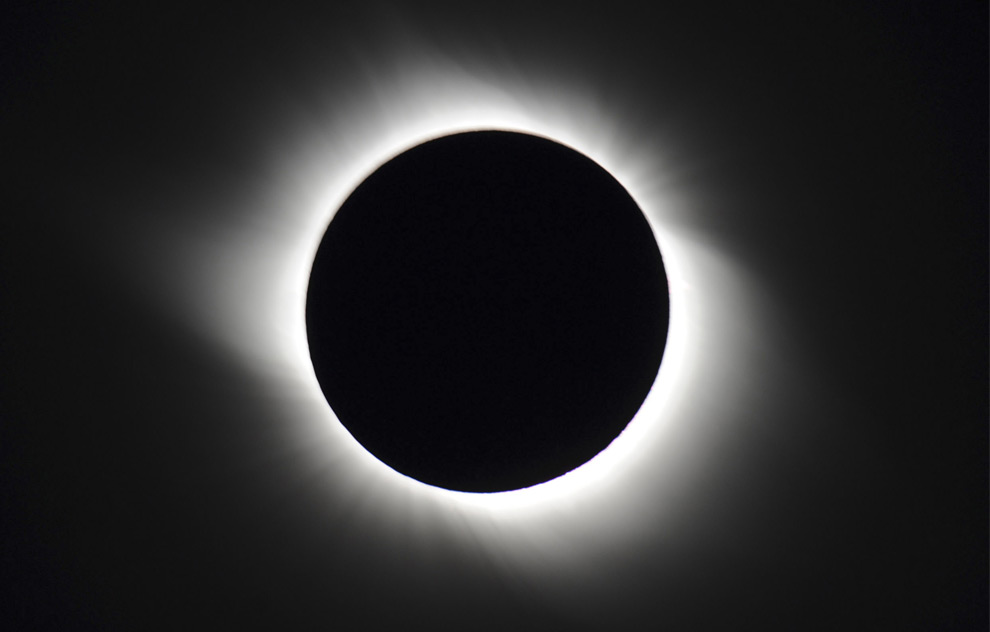All this to say that I have lately been preoccupied not merely with doing the mundane, but also with contemplating it, and contemplating that which I personally consider the antithesis of it: "an eclipse of thought."
I like the metaphor of an eclipse in describing this concept for a few reasons. First, eclipses are not only stunning phenomena, but also extremely rare. When they occur, they present themselves only to a few select individuals who are in the right location at the right time. An eclipse is an alignment of bodies moving independently of the line they are about to form, in other words, it is a coincidence that such a line is formed as their original trajectories are in no way designed or intended to cause such an event. But most of all, an eclipse has a way of unnaturally connecting objects that are separated by incredible distances, so that for a moment, they share a connection that is more intuitive than designated. And finally, the metaphor also makes me think of this mind-blowing scene from 2001: A Space Odyssey:

Here is an actual solar eclipse:

And another:

So what is all this about an eclipse of thought? Jung, in his text "The Spiritual Problem of Modern Man" elaborates at some length about the requisites of the "modern man." His primary demand of the modern man though, is that he must be at the brink of human thought, he must, in a word, be knowledgeable of all that has preceded him, until he has come to the end of all progress. The modern man must be he that is ready to evolve, to take the next step, to advance further than any other has yet advanced. He must, as Jung phrased it, "stand before the Nothing out of which All may grow."
But how is one to know what has been? In dredging through the nearly infinite resources that lay before him, how is one to cull out the necessary facts of human development, how is he to find among millions of worthless meteorites the one star that shall guide him onward? And how is one to know, should he reach such a point in his development, toward which unthinkable and as yet nonexistent point he must strive?
This is the work to which I refer whenever I use the term 'assimilation.' Assimilation is exactly this: it is gazing at the entire history of humanity, at an infinite myriad of facts, speculations, opinions, falsehoods, errors, half-truths, delusions, convictions, inspirations, confessions, creeds, beliefs, agendas; it is gazing at madness and sanity, love and hate, enlightenment and debauchery, hope and despair; at all things, and from without this sum of knowledge, discovering that which really matters.
It is then that the moment begins to form. The brighter stars begin to be discernible from the rubble. Their courses in the sky begin to paint a zodiac as the great forms of the past become known and understood. Such beings commune with each other across eons; their light, shining forth from the distant echos of the past, strikes the eye of the one who searches as surely as though its first venture into the dark had not long since passed beyond the memory of the rabble. And now the searcher is no longer a member of his people, his time, or the thoughts of that same, ever present rabble. He has become a member of a greater people, without time, whose thoughts have endured and grown over centuries. And as the thoughts of these greater ones begin to align, so too the searcher is catapulted out of the orbit of his own system, beyond the limits of his kind, into the void, and there, at that moment, is the eclipse. He has aligned with the past, though none might see it, obscured as it is; and he has progressed beyond what is into what is not, to renew again the same progression, to extend the line, so that in centuries to come another may perceive it again, and extend it again.
This, I believe, is what I live for. I cannot conceive of anything more stunning, more majestic, more triumphant, and more worthwhile. I cannot conceive of anything less mundane. Who knows, perhaps I shall succeed in achieving this.

"stand before the Nothing out of which All may grow."
ReplyDeletei read this post and i find a treasure of thoughts to live by :) yes, you make me rich :)